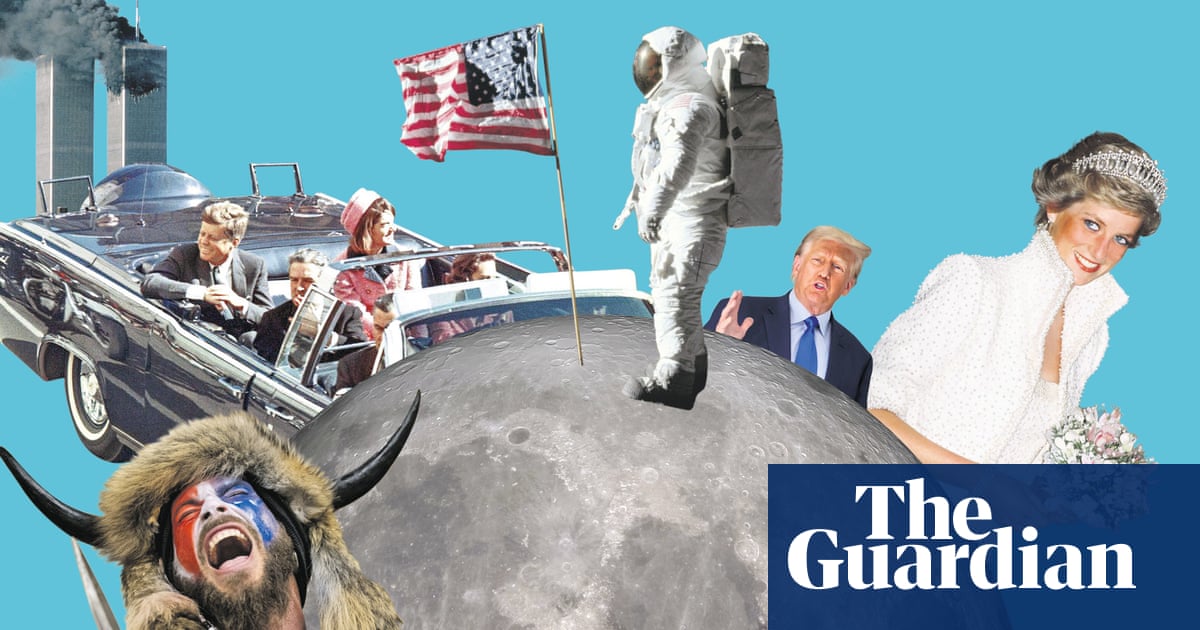
After five seasons of the groundbreaking TV drama Lost, the formula had started to get stale – to say nothing of the endlessly convoluted mystery at its heart. And so, for the sixth and final series, the producers added a new twist: as well as the flashbacks and flash-forwards that had come to define the show, it introduced the flash-sideways, showing the viewers an alternate reality where the no one was ever marooned on a deserted island.
Anyway, as we come to the season finale of the Long 2020, with the reintroduction of a global villain viewers thought was defeated and an increasingly convoluted B-plot involving chaos in the top tiers of the British state, I thought I would borrow that concept.
Yes, rather than doing a look back over the year that was (because no one needs to dwell on that for a second longer than is necessary) or a prediction of what next year might hold for us (if I do not hold out hope for good things then I cannot be disappointed), I thought we could do something different, and look at what might have been if previous predictions had been a bit more accurate …
2017
Christmas 2016. The world was reeling from the election of Donald Trump, Mark Zuckerberg had just said it was “crazy“ to think that Facebook might have played a part, and I was predicting that the big story of 2017 would be … virtual reality.
I thought that the recent release of Sony’s PlayStation VR, Oculus’s Gear VR and Google’s Daydream all pointed to an imminent mainstreaming of the technology – or, at least, a definitive answer as to whether or not VR had what it took to break out of the early adopter bubble.
That means there’s two versions we could flash-sideways to: the one in which VR succeeded, or the one in which it flamed out in an industry-destroying mess.
It’s fairly easy to see how the latter filters through to today. If 2017 had been the death knell for the VR industry – rather than another year of sales being just high enough to continue investment, but just low enough to claim success – then we wouldn’t be talking about the “metaverse” in anywhere near the same tenor. Facebook’s investment in Oculus would have been written off, Sony would have shuttered its VR project, and Google … well, Google did sunset Daydream, but that’s just because someone in Mountain View clearly gets off on killing products.
But the former is harder to imagine. With the benefit of hindsight, it’s clear that the technology simply wasn’t sufficient for mainstream acceptance: even Facebook’s Oculus Quest 2, several generations improved from what it was selling five years ago, is still clunky enough that the company’s head of communications, Nick Clegg, blasts it as a “wretched headset” while wearing it for a PR stunt with the Financial Times. So a victory for VR in 2017 would have been still confined to a niche – but if that niche was “video games”, the industry today would be transformed.
A breakout success for Sony’s PSVR, for instance, would at the very least have radically changed the company’s plans for the PlayStation 5, foregrounding plans for a successor to the VR system. But the biggest ramification, I think, would have been if Facebook’s Gear VR – a collaboration with Samsung that let users slot their Galaxy phone into the headset for low-cost accessibility – had been a hit. Mark Zuckerberg has wanted to build a VR-based social network since he acquired Oculus back in 2014, but the user numbers have never been big enough to fully commit to. Even the Meta rebrand was predicated on hope for the future, rather than success in the present.
If Oculus had exploded in popularity five years ago, though, you can be sure that Facebook would be all-in on VR by now. The motivation remains the same in either world: a desire to own the platform on which Facebook is built, rather than have to play by the rules of, first, the open web and later the app stores of the major players. We’d be five years ahead on the transformation to “Meta” – but, of course, only if the events of 2018 had also been somewhat different from reality …
2018
As 2017 drew to a close, the “techlash” was beginning to brew: the events of the year had served to raise more questions than ever about whether the largest tech companies in the world were fit to hold the power they had amassed. Against that background, questions were being raised about one Silicon Valley company, which had an uncomfortably close relationship with the American right, was credibly linked to the rise of Donald Trump, and was being remarkably cavalier about the safety of children and young people on its platform.
But it wasn’t Facebook. As we looked ahead to 2018, the smart money was on an annus horribilis for YouTube. The video sharing site’s widespread use by far-right shock jocks had been noted in the wake of the Unite the Right rally in Charlottesville, Virginia, and the phrase “algorithmic radicalisation” was on everyone’s lips: how far down the rabbit hole could YouTube’s recommendations take someone? “The world’s largest broadcaster has started to wake up to the fact that time and again, it is cited as part of the ‘radicalisation pathway’ that turns young men from bedroom shut-ins to mass murderers,” I wrote at the time, predicting that it would be forced to take action.
On top of that, the same algorithmic pressure was leading to utterly bizarre content being screened for children on the site, with one internet theorist calling the site’s practices “infrastructural violence” against children.
And then, in March that year, the Cambridge Analytica scandal broke in the pages of the Observer, and YouTube was forgotten.
The ramifications of that diversion have been long-lasting. Even as the techlash broadened from Facebook to the wider industry, with leaders like Tim Cook and Jack Dorsey invited to sit alongside Mark Zuckerberg and be shouted at by US legislators, YouTube has been forgotten. Susan Wojcicki, the company’s long-running chief executive, has never been grilled by Congress. Her boss, Sundar Pichai, has been; but YouTube rarely comes up in those conversations. Contrast that to, say, Instagram, which frequently gets treated like its own company in such discussions, even though the top down control of the latter is much stronger than the former.
With or without the Cambridge Analytica scandal, Facebook was always going to face a reckoning given its involvement in the 2016 election. But YouTube has managed to remain largely unchanged over a period that’s seen all of Google’s peers forced to radically alter their ways of doing business. Perhaps it would have been better if this were one prediction that had come true?
---
Apologies for this brief interruption. There’s more of you reading TechScape than I ever thought would sign up – and you’ve stuck around even while I’ve been off on parental leave. But success is measured on more metrics than just pleasing the audience. Like all Guardian journalism, this newsletter is open and free for everyone to enjoy. There’s no Substack paywall here, no weekly second edition for supporters only. But if you do like what I do, and value quality Guardian journalism, then it would be fantastic if you’d consider supporting us. Make a contribution from just £1, or become a digital subscriber for a little more – however big or small, every act of support keeps us open and independent.
---
2019
OK look, I actually did pretty well in my predictions for 2019. That may be because I had a fairly dull selection (wow, past-me, you really thought you’d set the world alight with that prediction that USB-C would be in more things, huh?), and generally I’d rather be wrong but interesting that right and boring. But, being right still feels quite good.
Still, there’s one major flub: I thought that Epic Games’ decision to launch a competing App Store on Android was a seriously consequential step, and one that could up-end the power of the app stores in general. I maintain my reasoning was sound. This was Fortnite at the peak of its popularity, suddenly being rendered unplayable on Android unless you installed Epic’s competing games store. It was a strategy that the company did indeed successfully pursue on computers, where it’s managed to bootstrap a competitor to Steam, the pre-eminent PC gaming platform, with just gumption, hard work, and billions of dollars in incentive payments to publishers for exclusivity.
Epic’s problem, it turned out, was that while Google technically makes it possible to install a second App Store on Android platforms, it doesn’t make it easy. Add to that the fact that, anecdotally, Fortnite’s smartphone players are more likely to be on the younger end of its demographic, and so less likely to be able to pull off the complex steps required and less able to voice their displeasure at Google’s limitations, and Epic found it had argued itself into a corner.
We all know what happened next, of course: reinstated to the Android App Store, Epic took the nuclear option, simultaneously breaking the rules of both Android and iOS in a bid to get itself thrown off the stores with standing for a lawsuit.
But what would it look like if Epic’s stance on Android had worked? I think one possible answer is – not actually as good as Epic hopes. Alternative app stores for Android aren’t unheard of, after all, particularly in mainland China where Google’s own App Store is unavailable. Epic may have been able to avoid Google’s cut of in-app payments on Android, but it seems unlikely that it would be able to parley that into a wider competitive position. Instead, if the Chinese experience is instrumental, it would be more likely to open up a situation where every major app has its own unique App Store, and every minor app finds itself needing to be present on multiple app stores at once or run the risk of pirates stealing its customers.
And then, of course, there’s the fact that Epic’s position on iOS wouldn’t have improved one bit from the painful showdown. In fact, it could conceivably be in a worse position that it is in our world – one where its case against Apple is weakened by the demonstrable fact that Apple’s claims that opening up the App Store would harm user privacy and security are true.
2020 and 2021
Over Christmas 2019, I drew up a list of 20 trends that would define 2020. Twenty! Surely I covered everything that would happen in the coming – ah, right. Yes. In 2021 I didn’t even bother to make any predictions, and yet I still got it wrong, because the fact that I sit here today, in effective lockdown due to a coronavirus outbreak, is … not something I would have predicted this time last year.
That said, I did get some things right, from the fact that workplace activism would come to Apple (aided by the pandemic, which pushed the secretive company on to remote working platforms and so enabled organising for the first time) to the continued failure of the UK government to pass the online harms bill (now known as the online safety bill, and barely closer to actual passage than it was two years ago).
In fact, the pandemic probably helped tech futurists more than it harmed them. Its immediate effect on the industry was to accelerate trends that were already well on their way to fruition: if you predicted more people using videoconferencing, more people shopping online, or more people playing video games, well, the pandemic helped you out.
My major stinker was predicting the death of Facebook’s Portal, the company’s video-enabled Echo competitor. “Who would want to put an always-on microphone connected directly to Menlo Park in their homes,” I wrote. “Portal sales have reportedly been minuscule. A second iteration was squeezed out earlier this year; don’t expect a third.” Well, it turns out that a dedicated video-chat device is rather more compelling now than it was two years ago, and Facebook’s big pivot helps position the Portal as a halfway house between full VR and simple text chat.
Talking about the world of tech in the absence of Covid feels like an impossible task – what wouldn’t be different – but there’s one are that I think would be radically changed, and it’s not what you might think. Zoom, Slack and even QR codes were all slowly growing in importance, and while they may not have had the explosive growth that they did, the companies would be largely recognisable even if Covid had never left Wuhan.
Instead, the most 2020 story that wouldn’t exist without Covid was, I think, the rise of the “meme stocks” and the subsequent NFT boom. The tale of the second half of that year was one of a “K-shaped” recovery, with some people rapidly readjusting to life under lockdown even as others lost their livelihoods for months. Particularly in the US, where generous universal stimulus payments put money in the pockets of millions who simultaneously saw their monthly outgoings collapse, it lead to the creation of a fairly large group who suddenly had an awful lot of cash to burn, and an awful lot of time to burn it.
It’s no wonder, then, that Robinhood, the free stock-trading app that has faced criticism for “gamifying” day trading, saw a boom in use, as day traders piled in on stocks such as Hertz, AMC and, notoriously, GameStop. This year, the focus shifted from stock trading to cryptocurrencies and NFTs, but the underlying cause was, I think, the same: people with more money and time than they used to have, seeking an outlet for their boredom.
The question for the coming year, of course, is whether Covid is required to maintain that interest, or if it’s now reached self-sustaining levels of attention. I’d bet (and, if I’m honest, hope for) the latter, but we won’t find out for a while yet.












